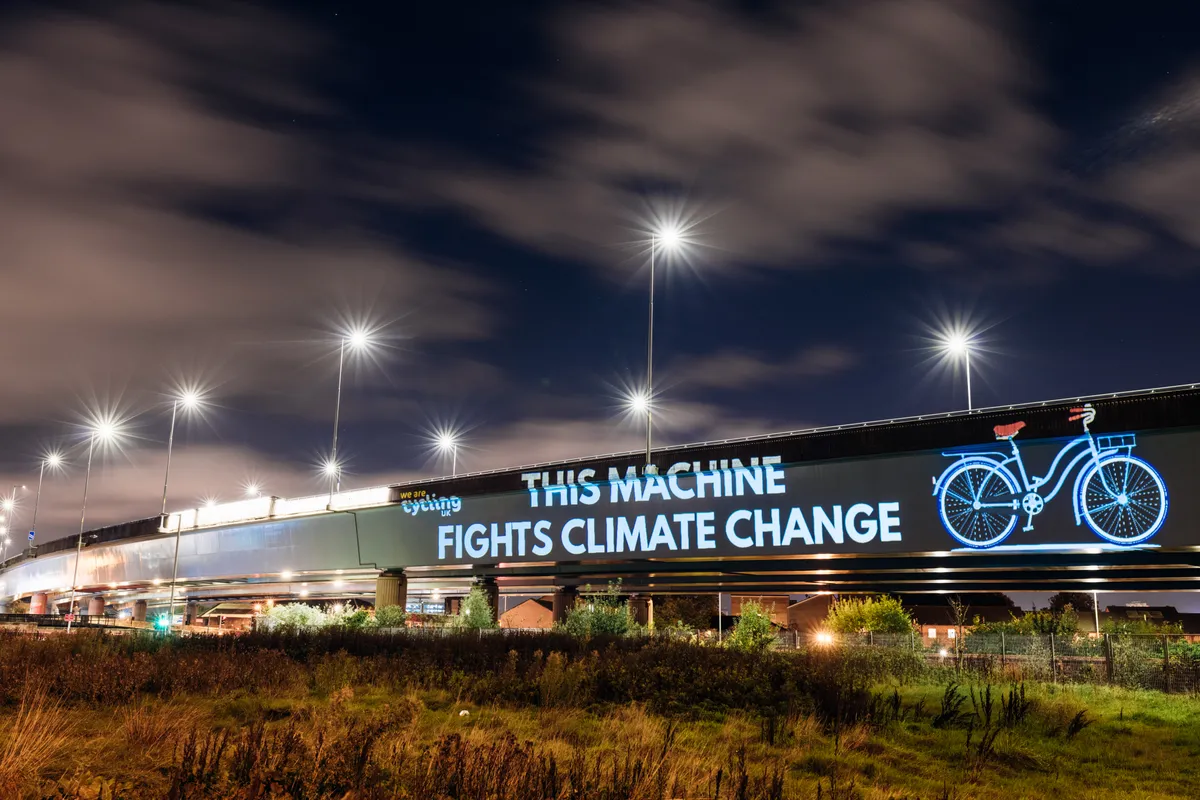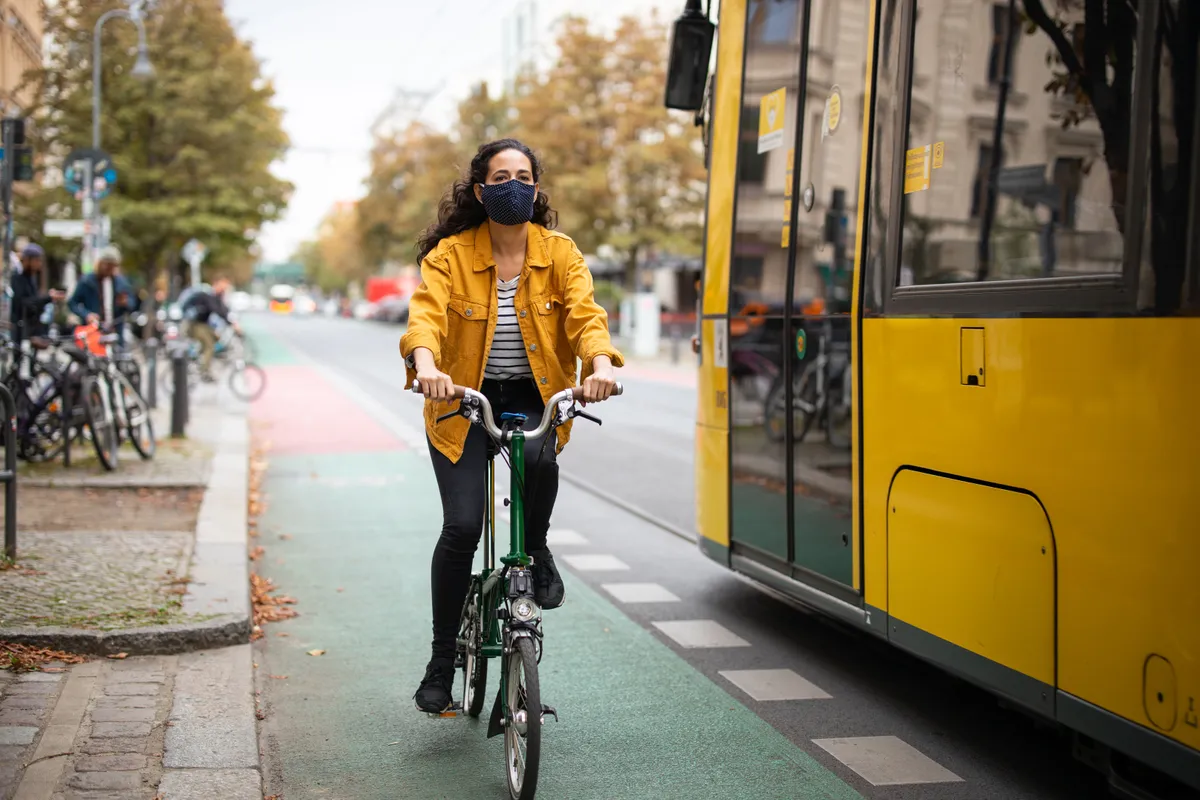With the lowest carbon footprint of any mode of public transport, cycling has long been touted as an effective way to meaningfully reduce carbon emissions.
And with transport responsible for 24 per cent of global CO2 emissions from fuel combustion, there’s no doubt cycling can play an important role in curtailing the climate crisis.
Yet COP26, which began earlier this week, doesn’t seem so bothered by life on two wheels; the transport day on 10 November includes no mention of cycling (or even walking or trains, for that matter).
This hasn’t stopped cycling from being forced into the debate.
Some people have cycled to Glasgow to highlight cycling’s potential, while a range of organisations have rallied together in order to put pressure on leaders and politicians.
But what will it take to truly unlock the emissions-reducing potential of bicycles and how does cycling fit into the broader conversation of sustainable transport? We spoke to Cycling UK and Chris Boardman to understand cycling’s role in the climate crisis.
Getting cycling in the conversation

A number of cycling advocacy groups have come together to sign an open letter calling on governments to boost levels of cycling in order to meet climate goals effectively and quickly.
One of these organisations is Cycling UK, which is currently at COP26. It has been campaigning around the hashtag #ThisMachineFightsClimateChange on social media, as well as projecting images of bikes with the slogan across landmarks in Glasgow.
Cycling UK, a charitable organisation that promotes all forms of cycling, is also organising a ride as part of the International Day of Action march in Glasgow on 6 November. It has been working with Pedal on Parliament to encourage people to organise rides advocating cycling across the UK, and there are now events planned in Cardiff, Ludlow and Devon.
This is part of a strategy from Cycling UK to raise awareness of cycling in the public and – in a bottom-up approach – to put pressure on politicians and leaders to take cycling seriously.
“We’ve got world leaders at COP26 but, at the end of the day, we need to be realistic,” says Keir Gallagher, Cycling UK’s campaign manager, speaking to BikeRadar.
“We’re not going to get Joe Biden coming to chat to Cycling UK, but we’re trying to gain momentum around COP and get people to take our messages to their local leaders, MPs, MSPs and local councillors.
“Change has to come from the local area. If you want to see more cycle lanes in your city, the best way – wherever you are in the world – is to get cyclists in your area together and put pressure on representatives from below.”
Chris Boardman, who was appointed as Greater Manchester’s first transport commissioner earlier this year, has also been vocal about the potential of cycling during COP26 and will be travelling to the summit next week for the transport day.
Speaking to BikeRadar, Boardman points out how the summit acts as a way for individuals and authorities to forge relationships and, ultimately, move toward a world with more sustainable transport in cities.
One example he cited was Andy Burnham, Manchester’s mayor, travelling to COP26 earlier this week and meeting Anne Hidalgo, his Paris counterpart.
“What really resonated with him as a politician,” Boardman explains, “is Anne Hildalgo said, ‘before I got elected, taxi drivers were sending me death threats and when I got re-elected they were sending me bouquets'.’”
Now, Boardman says, Burnham is set to travel to Paris to learn more about the city’s move to pedestrianisation.
Boardman also highlights the need to sell cycling and for a collective voice, in order to force it into the conversation surrounding future transport.
“It’s like walking,” he says. “Nobody talks about walking. It’s not a very sexy thing. It doesn’t cost billions, and it’s hard to wrap it up into a package that makes people think, ‘wow’. That’s what we have to do. We have to make cycling an attractive package and force it into the conversation.
“Until you scale it, there isn't a lot of visible money. The cycling industry doesn’t have a collective voice, despite the protestations of the all-powerful cycling lobby.”
No bikes at COP26

What can be swept up into an attractive package – and does present a very visible spend and investment – is electric cars, which form the focus of the COP26 transport day.
Electric vehicles will undoubtedly play a part in a more sustainable future. But there are question marks around implementing the technology, from how people charge them, the cost of investment for an individual and how to make the electricity they run on sustainable, through to where the energy and materials used in production come from.
A new study by the University of Oxford’s Transport Studies Unit says active travel, which encompasses walking and cycling, “should be a cornerstone of sustainability strategies, policies and planning”.
However, sustainability studies and the opinions of established cyclists commonly butt up against how many people currently want to go about their lives.
For perspective, a YouGov poll found 43 per cent of people in Britain would be willing to switch to an electric vehicle, whereas 21 per cent would be willing to take more drastic action and substitute driving for a mode of active travel, such as walking or cycling, or public transport.
By switching to electric cars, people can continue to move around in ways that are not unlike how they move in diesel or petrol cars. “They don’t require you to change anything and make you feel like you’ve done your bit,” Boardman says.
Boardman sees the rise of electric vehicles as likely to go in one of two directions.
“There’s a massive opportunity or an incredible danger,” he says. “You could lock in car use for generations, or you could use this as a reset moment. All those cars need fuel, so you can decide where that fuel is and how much there is.
“You can fill your streets with chargers and move everyone from that type of car to that one, and you take up that public space and lock it in because you’ve invested in it. Or, you can say there’s one charger per household and within 300m of your house there is a car club.”
Cycling UK is also open to the role electric cars will play in the future, but is insistent there is an imbalance as to the future role of four-wheeled vehicles.
“Technology will always have a part to play,” says Gallagher, “but we need to look to the past as well as the future, and to put up some of the money going to electric cars and making flying less carbon-intensive to cycling.”
But how can organisations such as Cycling UK, and advocates including Boardman, help force that change?
Investment and government commitment

Much of Cycling UK’s attention is two-fold: the requirement for investment and the need for cycling to be taken seriously in public planning.
Cycling UK wants to see 10 per cent of the transport budget in the UK put towards cycling, with that percentage increasing over the coming years. This will help the government reach its target of doubling the number of journeys made wholly or partly by bike from 2013 levels by 2025, which Cycling UK has said is not currently going to be met.
“We know that how you get more people cycling is a significant investment in safe cycling infrastructure,” Gallagher says. “All of the evidence from wherever cycling infrastructure has been built – and all the evidence around why people don’t cycle – tells us that’s what we need to see the government doing.”
Despite YouGov’s findings on the reception of electric cars and active travel, Cycling UK says 77 per cent of people support measures in their local areas to encourage walking and cycling.
Gallagher points out how lockdowns last year showed what happens when fewer cars are around.
“We saw people want to cycle when they feel it is safe. We saw a 200 to 300 per cent increase in cycling when the roads were quiet. So that tells us the potential for a shift to more people cycling is there. We also saw a lot more families cycling and a lot more women cycling.”
Making cycling more inclusive, welcoming and diverse is also key. We know that current data on diversity in cycling isn’t promising and if cycling wants to really make a dent in the number of journeys by polluting vehicles, that has to change.
Cycling UK’s long-term goal is to get a million more people in the UK on bikes, but it stresses its aim is “not just to get a million more middle-class white men cycling,” says Gallagher. “It’s to get cycling to reflect the diversity of the population.
“We could just go for the low-hanging fruit, but that’s not what we’re trying to do. It’s pointless unless we get people from all backgrounds feeling like they want to cycle and can cycle.”
Boardman takes a slightly different stance, applauding government plans such as Bus Back Better. The strategy makes it clear funding for buses will not be given if it’s at the detriment of active travel, he says.
On a local level, Manchester has a plan to improve infrastructure for cyclists and pedestrians with money behind it.
“The government and Andy Burnham are very much aligned,” says Boardman. “We can deliver their policies because everyone agrees.”
It’s not a position Boardman is used to being in, considering Burnham, Manchester as a whole and the Conservative government come at things from very different ends of the political spectrum: “This is a strange place, and we’re not quite sure what to do with it.”
Boardman does, however, stress the government must remain committed.
“If we’re going to change street space so buses and active travel get a higher priority, we need the government to back that with regulations and funding,” he adds.
“Emotionally rinsing”

The debate around cycling and the future of sustainable transport is a complicated and far-extending web, one that even a brief foray into can leave you feeling bamboozled.
This is, of course, emphasised by the alarming reality of what’s at stake and animating the discussions in the first place: the climate crisis.
There is an oscillation between sensing the importance of even the smallest decisions and commitments when discussing sustainable transport and the debilitating sense of this debate being only one small part of an almighty struggle.
“It’s emotionally rinsing to be involved in it, on a personal level,” he explains. “When you care, it’s all personal and you can’t do anything about that. It eats into your life. The people I’m involved with – and myself – there’s quite a personal cost to it because you are mentally absorbed. But it’s important. It’s not hyperbole to say it’s planet-saving stuff right now.”
In the last 10 years alone, Boardman says we have seen more than 20 billion more miles being driven on unclassified roads – roads not a motorway, A-road or B-road in the UK – which is a 44 per cent increase in a decade.
Ever the optimist when it comes to the opportunity for cycling, Boardman says that, in a perverse way, it should offer the potential for change.
“Look how much shift you can get in a decade. That happened. And we can do that the other way.”
This won’t happen in one fell swoop, but Boardman and Cycling UK are both adamant cycling can play a central role in the fight against climate change, thanks to everything else it can offer beyond being a zero-emissions mode of transport.
“That’s before we even start talking about the health, mental health, reduction in congestion and pollution benefits,” says Gallagher. “Even if it were just for fighting climate change, cycling would be a great tool, but there’s so much more it can offer.”
Ultimately, despite the opportunity presented by active travel, cycling has largely been bypassed by COP26's global agenda, but the continued progress in cities such as Paris and Manchester, along with the growing voice – and network – of cycling's advocates, show there's some hope yet.
As momentum around the climate change discussion grows, cycling needs to stake its claim as a viable solution, according to Boardman.
“What’s fortunate for us is [that you can] pick any crisis and we’re the answer,” Boardman adds. “Health, climate, pollution, social cohesion, equity. We’re not just on a sturdy soapbox, we’re on lots of sturdy soapboxes. Right now, we have to make it a common language.”
